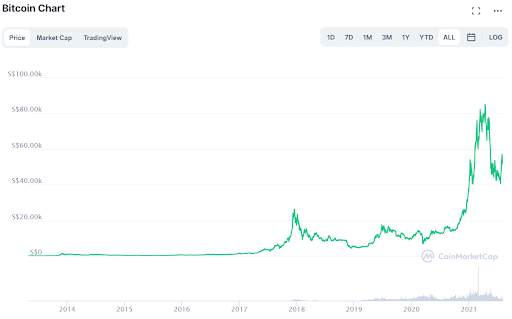Given the increasing ubiquity of Bitcoin internationally, much has changed since 2009. Here’s a deep dive into how it works, how you can invest in it, and what you can use it for in Singapore.
Cryptocurrency has been the talk of the town ever since 2020 rolled around, with the conversation being led by none other than Bitcoin. Not only did the granddaddy of all cryptocurrencies see a surge in trading volume, its price rallied from approximately S$7,360 in March 2020 to an eye-popping S$85,100 in April 2021.
Businesses and governments have been paying serious attention to Bitcoin as well. For example, American telco AT&T accepts Bitcoin for online bill payments. And from September 2021 onwards, the veteran cryptocurrency will be considered as legal tender in South American nation El Salvador.
Here’s all you need to know about how this pioneering cryptocurrency works, what it can be used for in Singapore, and how it can be earned.
- What is Bitcoin?
- How does Bitcoin work?
- What can Bitcoin be used for in Singapore?
- How can I purchase Bitcoin in Singapore?
- What are the investment prospects of Bitcoin?
- How about the risks of investing in Bitcoin?
- Conclusion
What is Bitcoin?
Filter out all the noise and you’ll realise that Bitcoin isn’t all that hard to wrap your head around. It is a digital currency released in 2009 by someone under the pseudonym of Satoshi Nakamoto that allows individuals to make payments without having to go through a financial institution.
This decentralisation removes any potential disputes between individuals as it mimics an old-school in-person transaction utilising physical cash.
However, Bitcoin has several advantages over traditional fiat monies, especially regarding transparency. Firstly, there’s a finite amount that can be produced, 21 million bitcoins to be precise. Secondly, the exact amount of bitcoins that is circulating can be viewed by anyone with an internet connection. Finally, you can also view every Bitcoin transaction that has been made.
So, there you have it: Bitcoin is just cash without a physical representation that’s also more transparent. The reason why its price keeps scaling new heights would be folks treating it as a store of value rather than a medium of exchange.
Remember, only 21 million bitcoins can be ‘mined’, much like how there is a limit to the amount of precious metals on Earth.
How does Bitcoin work?
Unbeknownst to many, Bitcoin is an entire ecosystem rather than just a unit of the digital currency that everyone knows. Here’s how it functions, from extracting new bitcoins from the network to finally transacting with it.
Bitcoin mining
As mentioned earlier, bitcoins are mined from the Bitcoin network, much like how precious metals are dug up from beneath the earth. Unfortunately, ‘mining’ is a bit of a misnomer. What’s really going on would be Bitcoin miners (or rather, their computers) processing and verifying transactions on the network instead of doing any actual mining.
The reward for ensuring the veracity of transactions 24/7 would be shiny new Bitcoins. As you can tell, recordkeeping is the furthest thing from a game of hide-and-seek where miners are digging through the network for undiscovered bitcoins. Naturally, users of the Bitcoin network are charged transaction fees for the miners’ troubles too.
This makes it worth their while because each new Bitcoin becomes increasingly harder to mine, mimicking the situation that precious metals face. And this keeps them in the game when all 21 million bitcoins have been mined.
But that’ll be a problem for their peers in the 22nd century. Seriously.
Transacting with Bitcoin
Fortunately, transacting with Bitcoin is much simpler, especially with the number of options that individuals in Singapore have these days. If you don’t have any Bitcoin to start with, you can sign up with any cryptocurrency exchange and convert your desired fiat currency to Bitcoin. Then, you can transact with your peers or any business that accepts Bitcoin.
Do ensure that you’re sharing your public key and not your private key when transacting with Bitcoin, or any other cryptocurrency for that matter. This is especially relevant when you’re the recipient rather than the sender. The public key is akin to your bank account number whereas the private key can be likened to a PIN number. You wouldn’t share the latter with anyone, right?
Frankly, this doesn’t matter as much if you’re using a hot wallet connected to your cryptocurrency exchange account. Most platforms streamline the process to ensure that you’re sharing only your public address when receiving cryptocurrency. If you’re using a cold wallet however, that’s when you have to keep the difference between public and private keys in mind.
Storing Bitcoin safely
Speaking of cold wallets, this brings us to the topic of transferring your Bitcoin and storing it safely. Cryptocurrency exchanges are highly secure these days in order to attract and retain users—likewise for Bitcoin itself, as it inherently prevents counterfeiting.
However, there’s the constant threat of a security breach occurring because these exchanges (and the hot wallets connected to them) are always online. For individuals who plan to hold a large amount of Bitcoin for longer periods of time, you’ll need a way to store your cryptocurrency safely. This is where cold wallets come into play.
These alternatives to hot wallets let you store your cryptocurrency offline in a secure manner, thereby preventing the possibility of hacks occuring. These cold wallets can be as rudimentary as a sheet of paper or USB devices with additional layers of security. Here’s a look at some of the best ones out there.
Best cryptocurrency cold wallets
| Name and wallet type | Price | Benefits |
| Paper | Free | - Hassle free and low-cost - Multiple copies can be printed - No risk of device malfunction |
| Ledger Nano X (USB device) | S$189 | - Approx. 1,800 cryptocurrencies supported - Small and light - Connectivity over Bluetooth or USB - Certified by France’s ANSSI |
| Trezor Model T (USB device) | Approx. S$240 | - Approx. 1,600 cryptocurrencies supported - Coins can be recovered if device is broken or lost - Open-source software used, allowing for better community feedback |
| KeepKey (USB device) | S$117 | - Approximately 40 cryptocurrencies supported - Priced competitively - Ability to convert cryptocurrencies that you own |
What can Bitcoin be used for in Singapore?
Unfortunately, businesses in Singapore haven’t really warmed up to the idea of accepting cryptocurrency as payment. Even multinational corporations like Tesla and Microsoft have changed their minds from time to time. The MAS has also stated officially that Bitcoin and its siblings aren’t considered as legal tender in the Lion City right now.
However, not all is lost. Kopitiam’s futuristic KOPItech branch at Funan allows diners to purchase food and beverages using Bitcoin or Ethereum. And if you’re out and about, ride-hailing app Ryde allows users to reload their RydePay wallet using Bitcoin.
Don’t have your debit or credit cards on you? Cryptocurrency ATMs located around the island let you cash out your bitcoins in a jiffy.
Expect the utility of Bitcoin to rise as cryptocurrency continues to mature as an asset class. And don’t be surprised to see things move at a quicker pace in Singapore, given the friendlier environment for cryptocurrency activity here.
How can I purchase Bitcoin in Singapore?
Although you might find it difficult to use Bitcoin in Singapore, purchasing it is exceedingly simple. Every cryptocurrency exchange supports Bitcoin due to its pioneering status and enormous market capitalisation.
Several examples include Binance, Coinhako, and Coinbase. No matter which one you sign up with, you’ll be able to purchase Bitcoin easily.
Alternatively, the aforementioned cryptocurrency ATMs located around Singapore also allow you to purchase Bitcoin in addition to cashing out the assets you have.
However, do note that these ATMs have a limit on how much you can purchase at a go. This limit varies from operator to operator, so always read the FAQs first.
What are the investment prospects of Bitcoin?
Today, Bitcoin is largely seen as an investment rather than a currency to be used. People are treating it as a store of value rather than a medium of exchange, to be exact.
That’s due to Bitcoin being limited in nature, although its protocol does allow for that cap to be raised when the supply is exhausted. Its perception is akin to that of digital gold.
If you’d like to invest in Bitcoin, the most straightforward way would be to trade it. This is similar to Forex trading on steroids. For one, the cryptocurrency market truly never sleeps, unlike Forex which takes the weekend off.
And Bitcoin’s price swings are still huge, despite being the oldest cryptocurrency in existence. Think: A S$7,000 movement for a single bitcoin in just one week.
On the flip side, you can simply purchase Bitcoin and hodl it in a cold wallet until it reaches your price target down the road. If you’re willing, you can opt to place your Bitcoin holdings in a cryptocurrency savings account to generate interest instead.
This interest rate varies from exchange to exchange, but that isn’t the only factor you should consider when comparing cryptocurrency savings accounts.
If purchasing Bitcoin directly isn’t your cup of tea, there are alternative ways to invest in it and the cryptocurrency industry as a whole. Here’s how:
How about the risks of investing in Bitcoin?
Although Bitcoin is the oldest cryptocurrency out there, it’s still extremely volatile. As mentioned, wild price swings within a day or week are still par for the course despite how long it’s been around the block.
You also need to remember that Bitcoin is suffering from a mini existential crisis, being unsure of whether it’s a currency or commodity.
Then there are regulatory concerns. Singapore might be a great environment for cryptocurrency exchanges, but other markets are more cautious, if not outright dismissive.
China for one hasn’t been kind to cryptocurrencies, shutting down cryptocurrency exchanges over the years and resolving to implement a crackdown on bitcoin mining in July 2021.
The U.S Securities and Exchange Commission has repeatedly sought for greater industry regulation as well. Its chairman, Gary Gensler, has said that cryptocurrency is ‘rife with fraud, scams and abuse in certain applications’.
Finally, there’s the inherent value of Bitcoin. Investors traditionally rely on gold as a way to hedge against inflation, but the precious metal is also purchased by companies operating in various industries for practical purposes.
However, Bitcoin’s value is largely perceived due to its scarcity and remember, it’s only considered as legal tender in a handful of places.
Conclusion
Bitcoin might be the elder statesman of cryptocurrency, but the way it works is still a mystery to most out there. Fortunately, this relatively newfangled digital currency is easier to understand than you might expect.
After all, its creation over a decade ago was to allow individuals to pay each other quickly and easily.
And because of how people across the globe maintain the Bitcoin network on a daily basis, Satoshi Nakamoto’s vision outlined in the Bitcoin white paper has come true. Bitcoin’s creation encouraged thousands of new cryptocurrencies to be birthed. Its closest competitor, Ethereum, even works differently altogether.
But that’s a story for another day.
In providing the above information, SingSaver is not to be construed as in any way engaging or being involved in the distribution or sale of any cryptocurrency or securities token ("crypto assets").
Neither singsaver.com.sg or the content on it is intended as securities brokerage or investment advice, as an offer or solicitation of an offer to sell or buy, or as an endorsement, recommendation or sponsorship of any company, trading platform or crypto asset; nor do we assume any risk or undertake any liability for the same. The content on singsaver.com.sg is for general information purposes only and does not review or include all available companies, products or offers.
Read these next:
A Keen Investor’s Guide To Cryptocurrency (2021)
Contrarian Investing: A Guide To This Nonconformist Investment Strategy
A Guide To Meme Coins And Whether They Are Worth The Risk
Should You Invest Your CPF Ordinary Account (OA) Money?
6 Alternative Investments To Diversify Your Portfolio
Similar articles
A Keen Investor’s Guide To Cryptocurrency (2021)
Cryptocurrency Exchange Comparison: Binance Singapore vs Gemini vs Coinhako
What Is Blockchain and How Can You Invest in It?
How Does Cryptocurrency Work? A Study in Bitcoin
How Ethereum Works: Singapore Edition
5 Ways To Buy And Invest In Bitcoin In Singapore
7 Best Cryptocurrency Exchanges To Use In Singapore (2022)
A Guide To Meme Coins And Whether They Are Worth The Risk









.jpg?width=280&name=Money%20Confessions%20(Orange).jpg)

